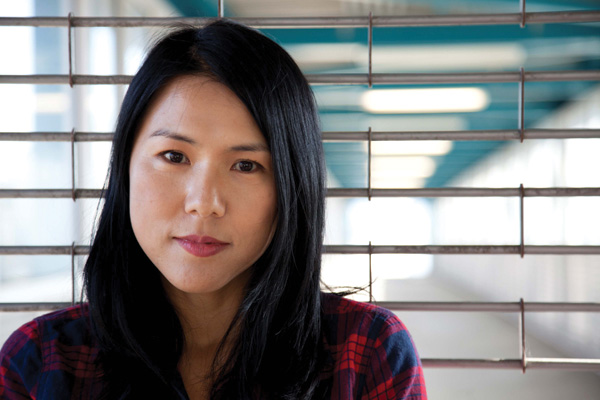by STEVE HAN | @steve_han
editor@charactermedia.com
When author Suki Kim was offered a job teaching English to the sons of North Korea’s most privileged families in 2011, she knew it would offer a rare opportunity to dive more deeply into the walled-off country.
Kim, author of the 2003 mystery novel The Interpreter, was no stranger to official North Korea, having paid several visits over the last decade on reporting trips for the New York Review of Books, Harper’s Magazine and the New York Times.
Yet, the 44-year-old told KoreAm by phone, the more she traveled around the country, the less certain she became that she was sharing the real stories of its people.
“There are so few unfiltered portraits of life inside North Korea, and our understanding of this brutal nation remains dismal,” she wrote in a statement on her website.
Kim, who was born and raised in South Korea and came to the United States with her family at 13, applied in 2008 for a teaching position at Pyongyang University of Science and Technology (PUST), an all-male private school founded and run by a Korean American evangelical Christian who runs a similar school in Yanji, China.
Between June and December 2011, Kim taught, ate and lived among her students in full immersion mode, taking great pains to secretly jot down her notes and observations amid heavy surveillance.
Her effort culminated in a memoir, Without You, There Is No Us: My Time with the Sons of North Korea’s Elite, published by Crown Publishers in October. (The book’s title is taken from the lyrics of a famous North Korean song, “No Motherland Without You,” dedicated to the late leader Kim Jong-il, whose death occurred a day before the author left North Korea.)
Kim, who lives in New York, spoke with KoreAm about her experience writing the memoir. The interview has been edited for length and clarity.
Why did you decide to write this book?
I’ve been visiting North Korea since 2002. [When] I went back to Pyongyang [in 2008], it became clear to me that I couldn’t really write about my travel experiences with any meaning because [of] government propaganda. I wanted to find a way to be embedded in North Korea. So when this opportunity came up, I knew it was a unique chance to go in and really experience what the truth is.
What was the goal of your book?
I’m not a political pundit. I never approached it from a political point of view. I’m also not a regular journalist. As a writer, but also on a personal level, my goal was to humanize North Koreans by putting faces to their names. I wanted them to become real people for my readers. I wanted to get to know what the world was like for North Koreans. I went in there and came out with 400 pages of notes. It was important that my experience was about my relationship with the students.
What was it like teaching at the school? What were your students like?
I had to get each lesson approved by North Korean staff. Every class was recorded and reported on by a student. I had about 50 students, all boys, in my class. They were young, they were vulnerable. They were only [ages] 19 and 20, and they were really missing home. There was always a duality to the students. They seemed very curious, and yet wary—and understandably so. I was the first person from the outside world they had encountered. They were excited and distrusting at the same time.
Tell us about the living circumstances.
For the entire six-month period, we all lived together in an isolated compound, which we could never leave [without permission from the guards]. Because we were in such isolation, we spent a lot of time together. I ate three meals a day with [my students], I played sports with them. So there was definitely that familiarity that comes with close proximity. The proximity made us closer. When you eat three meals a day together, even when you’re watched all the time, some sort of bonding happens.
Were the students allowed any outside contact?
The students weren’t allowed to keep in touch with even their families, who presumably lived in the same city as most of North Korea’s elites in the capital. I was the only thing they had, and they were the only things I had. That helped to break barriers and develop an intimacy.
You had to record your notes in secret. Were you ever in fear of getting caught?
Yes, constantly. It’s a very, very frightening world there. I was watched 24/7. The fear is constant in the book. The fear was always a part of being in that country. I poured all of me into this book. It would be too dangerous for me to go back there today.
What other restrictions did you face?
I wasn’t allowed to speak to my students in Korean, but they knew I [was able to] because I would speak [Korean] to the staff. They also spoke to each other in Korean and would see me laugh whenever they said something funny. So, we had a secret language of communicating. [The students] also once told me they felt more comfortable because they were with a Korean teacher.
You devote some sections of the book to discussing your personal connection to the Korean peninsula. How did your own past inform this memoir?
I was born into the Korean division in a way. Both sides of my family had relatives in North Korea, but they lost touch during the Korean War. Although I grew up with that sorrow since birth, it was never a journalistic interest. When I came to America at 13, I did not speak a word of English. I suddenly lost my language and home. I think that loss at such a sensitive age affected me. I was really haunted by the idea of home. When I first went to North Korea by chance, I really identified with it. When we talk about the Korean division, we’re talking about a generation that died missing the people they loved. So arriving in North Korea in 2002 as a writer, I wanted to find a way to experience that sorrow for the rest of the world.
What was the funding structure of the school?
The organization that set up the school basically funds the whole project; the whole thing was run by donations. [North Koreans were given the chance to] educate their kids in a top-notch facility without having to pay for it, which for North Korea is a good deal. It’s also propaganda, because it gives [officials] a facade of looking like the rest of the world.
A day before you left North Korea, Kim Jong-il died, and his son, Kim Jong-un, became the country’s new leader. How did your students react to the development?
I can only talk about what I saw [among] the small number of [my students], but what I saw was genuine. I wasn’t a journalist interviewing people on the streets. In my [view], the [students’ reverence for Kim Jong-il] was more than fear. And it’s not that hard to understand if you know their system. In a way, Kim Jong-il, and now Kim Jong-un, wasn’t just a leader. They are to North Korea what Jesus is to Christians. Kim Jong-il is the meaning for everything. He’s the reason for this world. He’s the savior. He’s the reason for you being alive. This is a country where all the books are about him, where all of what the television [broadcasts] is about him, where all the songs are about him. In that world, for Kim Jong-il to die, of course they were shattered. They were genuinely traumatized and heartbroken. It’s not an unfathomable sorrow.
What do you think the future holds in store for your students?
Back then, you wondered what would become of their world. But now, we know there haven’t been many changes. North Korea has just been referred by the United Nations to send their leaders to the International Criminal Court for crimes against human rights. I genuinely felt like these were my kids, but they were stuck in that gulag. That’s the world, ultimately, they live in. Their country has the worst human rights issues in the world. The sadness always came from being aware of the world they’re going to inherit and the world they’re going to actually run—and the world they are stuck in. It’s a horrible feeling.
What was it like leaving the school when it was time to return to the U.S.?
When you develop such a close bond with students, you care a great deal. I just couldn’t forget about the predicament my students were in. I mean, what will they even do after learning English in school? The fact is, they won’t even be allowed to leave the country—and they are the future leaders of North Korea. On my last day, when we were saying goodbye, I asked my students if there was anything they wanted to ask me. They asked me to address them in Korean, which was really heartbreaking. They weren’t allowed to express their feelings to me before that. I realized, at that moment, they really wanted a bond.
___
Featured photo courtesy of Ed Kashi-VII.








